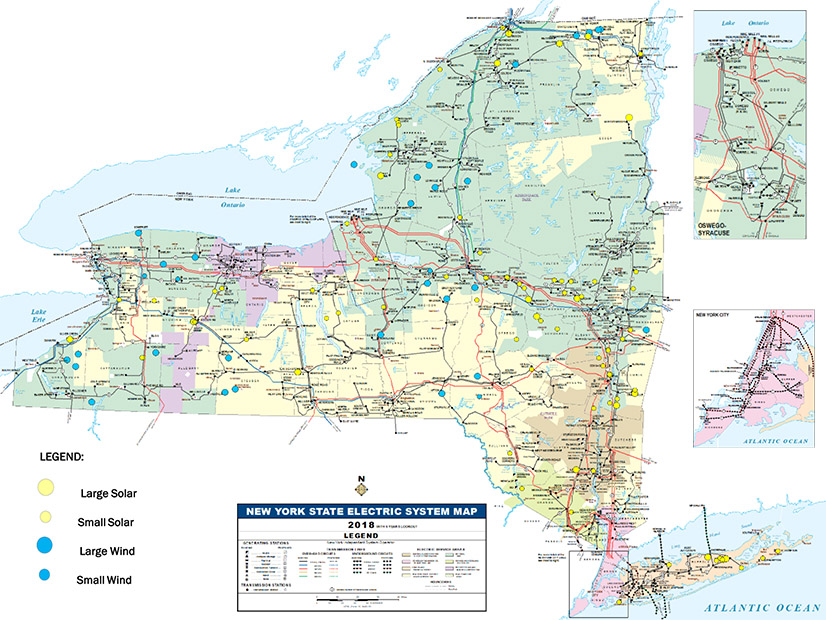NYISO stakeholders on Monday voted to recommend that the ISO’s Class Year 2021 (CY21) study results and cost allocations move to the Operating Committee for a vote next week.
Nearly 120 stakeholders attended Monday’s Transmission Planning Advisory Subcommittee meeting, where NYISO shared the list of upgrades required to reliably interconnect the 57 projects included in the CY21 study, at a cost of up to $900 million.
NYISO Manager of Facility Studies Wenjin Yan shared that 54 projects were requesting both energy resource interconnection service and capacity resource interconnection service (CRIS), while three members were CRIS only.
Decision Process and Timeline
With the upgrades and cost allocations for the CY21 projects identified, the ISO will now seek OC approval for the class year study reports, which include the allocations for CY21 system upgrade facilities (SUF) and system deliverability upgrades (SDU).
The OC’s approval of the CY21 study report will trigger the start of the initial decision period, during which class year developers will have 30 calendar days to accept or reject their cost allocations for SUFs and SDUs, and deliverable megawatts, if available, by providing NYISO either an acceptance or non-acceptance notice.
Developers who reject their cost allocations during this initial period will trigger additional decision rounds in which the ISO will issue within 14 calendar days a revised CY21 that removes projects that rejected their cost allocation, whereupon the remaining developers will have an additional seven calendar days to provide their acceptance or rejection to the revised CY21 cost allocations.
If additional rejections occur in subsequent rounds, the rejected projects are removed from the CY21 and the ISO will issue another revised CY21, and this iterative process will continue until all remaining CY21 members accept their respective cost allocations.
Once the remaining CY21 projects have accepted their cost allocations, developers will have five business days to pay cash or post security for the full cost allocation amount, and any developers who intend to post security are encouraged to reach out to applicable transmission owners to ensure the type of security that they intend to post meets the applicable transmission owners’ security arrangement requirements.
NYISO pointed out that developers who fail to notify the ISO by a stated deadline will be deemed as submitting a non-acceptance notice and removed from the class year.
Due to projects that reject their cost allocations in one round, the remainder of the CY21 members may see their CY21 cost allocations and any deliverable megawatts revised based on the updated study results.
NYISO also shared rules and procedural elements of this decision process, noting how developers that have additional SDU studies may accept their SUF project cost allocations, but separately accept or reject their SDU costs.
Developers with additional SDU studies not yet completed before the start of the CY21 initial decision period are given the ability to accept their SUF costs at this time and proceed with the additional SDU studies until they are completed or they can wait until the additional SDU studies are completed and, at that time, accept or reject the SUF and SDUs.
The ISO shared anticipated CY21 calendar breakdown, noting that the CY23 study could start as early as Jan. 3, 2023, with one decision round, or Feb. 13, 2023, should the CY21 study enter three decision rounds; however, CY21 can proceed with more than three decision rounds.
In response to questions about the timeline and whether the process could be sped up, Yan responded that “there is no reason we are going to hold up the results” if things could move faster than anticipated as the ISO “will use all their efforts to meet class year and tariff schedules.”
CY21 is considered complete once the class year report has been completed and all remaining developers have accepted and paid — or posted — security for their respective cost allocations.
Next Steps and Voting
Attending stakeholders recommended that the CY21 final results and cost allocations proceed to the OC for approval, though one objection was submitted by Empire Offshore Wind LLC, which represents two CY21 projects: Q958 (EI Oceanside 1) and Q959 (EI Oceanside 2)
The final report will be presented for approval at the next OC on Oct. 24. If approved, developers will have 30 calendar days to decide whether to accept their respective CY21 cost allocations.
If all 57 CY21 members accept their cost allocations, and no further decision rounds are required, then the ISO anticipates CY21 will end on Dec. 2, with the Class Year 2023 (CY23) study expected to start on Jan. 3, 2023.



